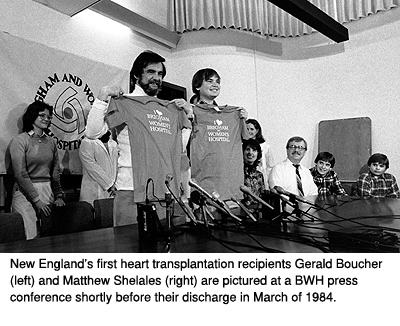Celebrating 20 Years of Historic Achievement in Transplantation

New England’s first heart transplant
On February 2, 1984, the newly formed Brigham and Women’s Hospital enjoyed its first nationally recognized milestone when a 43-year-old man became the recipient of New England’s first transplanted heart. This event, which was followed by a second heart transplant just eight days later, displayed the caliber of clinical achievements capable at an institution still very much in its infancy and set the stage for many trailblazing procedures, treatments and scientific discoveries—accomplishments for which BWH is highly regarded and recognized today.
Four years prior, in 1980, the Peter Bent Brigham Hospital, Robert Breck Brigham Hospital and the Boston Hospital for Women had come together to form Brigham and Women’s Hospital (BWH). These pivotal heart transplant surgeries established the new institution’s ability to orchestrate a tremendous accomplishment across various surgical and medical disciplines.
“The first heart transplant defined the identity of BWH in many ways. This achievement was the first collective effort among a very diverse group of clinicians.
It was one which instilled much pride throughout the entire institution,” said BWH cardiologist Gilbert Mudge, MD, who at the time served as clinical director of Cardiology and director of BWH’s Cardiac Transplantation program.
John Collins, MD was the cardiac surgeon leading the surgeries and Lawrence Cohn, MD, BWH’s current chief of Cardiac Surgery, assisted. Richard Shemin, MD, who has since left BWH, also assisted. Mudge was the lead cardiologist handling both patient cases.
The first transplant was performed on a 43-year-old man and the second on a 16-year-old boy. In various interviews given in 1984, Collins explained that both patients had an 80 percent likelihood of surviving for one year and a 50 percent likelihood of surviving for five years. Although the first patient passed away within a year following his surgery, the second patient is still alive and is actively followed at BWH.
“The techniques and technology used in these two cases and the eight others that followed in 1984 were considered to be state-of-the-art at the time,” said Mudge. “What would now be considered routine transplants were labeled as highly complex back then.”
“Today, with the help of modern medicine and sophisticated techniques, which include state-of-the-art mechanical assist devices, we have the capability to provide much sicker patients with new hearts. The strides made in the field of transplantation and heart failure continue to provide us with new opportunities for patients, who otherwise would not be survivors,” added Cohn. BWH was the eleventh institution nationwide to successfully perform a heart transplant and has since conducted approximately 466 heart transplants, performing an average of 12 to 15 procedures each year.